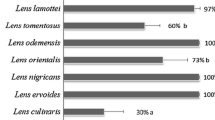Abstract
Hybrid necrosis in wheat is a problem for gene transfer in wheat breeding. Hybrid necrosis occurs due to dominant complementary interaction of two genes, Ne1 and Ne2. A cross between wheat (Triticum aestivum L.) varieties C306 (drought tolerant, Ne1 carrier) and WL711(high yielding, Ne2 carrier) produced necrotic F1 hybrids, which died before ear emergence and produced no seeds. To overcome the problem of hybrid necrosis, ears enclosed in the leaf sheath were taken and cultured to maturity in liquid medium containing 5% sucrose and 0.04% glutamine. The necrotic hybrids produced only a few seeds per ear compared to parents, but individual grain weight was similar in the hybrid and the parents. The F1 ear culture study has been repeated for three years and F2 seeds obtained. In 1996–97, the cultured ears of F1 hybrids produced 62 seeds, of which only 52 showed germination and were grown under normal field conditions. Out of the 52 seeds, 50% were non-necrotic and showed segregation for various physiological traits. The results reveal that hybrids ears had the potential to form viable seeds. Culturing of wheat ears before ear emergence and production of viable F2 seeds from necrotic hybrids is a simple and efficient method for overcoming the problem of hybrid necrosis.
Similar content being viewed by others
References
Barlow EWR, Donovan GR & Lee JW (1983) Water relations of wheat ears grown in liquid culture: effect of carbon and nitrogen. Aust. J. Plant Physiol. 10: 99–108
Chen Z, Evans DA & Vasconcelos A (1989) Use of tissue culture to bypass wheat hybrid necrosis. Theor. Appl. Genet. 78: 57–60
Hermsen JGTH (1963) Hybrid necrosis as a problem for the wheat breeder. Euphytica 12: 1–16
Lata S & Sethi GS (1998) Expression of necrosis in the hybrids of amphiploids Triticum durum-Hynaldia villosa and Hordeum chilense-Triticum durum with some bread wheat cultivars. Indian J. Genet. 58: 279–283
Lee B, Martin P & Bagerth F (1989) The effect of sucrose on the levels of abscisic acid, indoleacetic acid and zeatin/zeatin riboside in wheat ears growing in liquid culture. Physiol. Plant. 77: 73–80
Nishikawa K, Mori T, Takami N & Furuta Y (1974) Mapping of progressive necrosis genes, Ne1 and Ne2 of common wheat by the telocentric method. Jpn. J. Breed. 24: 277–281
Singh BK & Jenner CF (1983) Culture of detached ears of wheat in liquid culture: modification and extension of the method. Aust. J. Plant Physiol. 10: 227–236
Sinha SK, Aggarwal PK, Chaturvedi GS, Singh AK & Kailasnathan K (1986) Performance of wheat cultivars in a variable soil water environment. I. Grain yield stability. Field Crops Res. 13: 289–299
Srivastava PSL & Singh SR (1988) Identification of genes for hybrid necrosis in wheat. Indian J. Genet. 48: 267–269
Zeven AC (1981) Eighth supplementary list of wheat varieties classified according to their genotype for hybrid necrosis. Euphytica 30: 512–539
Author information
Authors and Affiliations
Rights and permissions
About this article
Cite this article
Dalal, M., Vijaya Lakshmi, K.V.S., Khanna-Chopra, R. et al. Ear culture as a technique to overcome hybrid necrosis in wheat. Plant Cell, Tissue and Organ Culture 59, 151–154 (1999). https://doi.org/10.1023/A:1006425421925
Issue Date:
DOI: https://doi.org/10.1023/A:1006425421925




